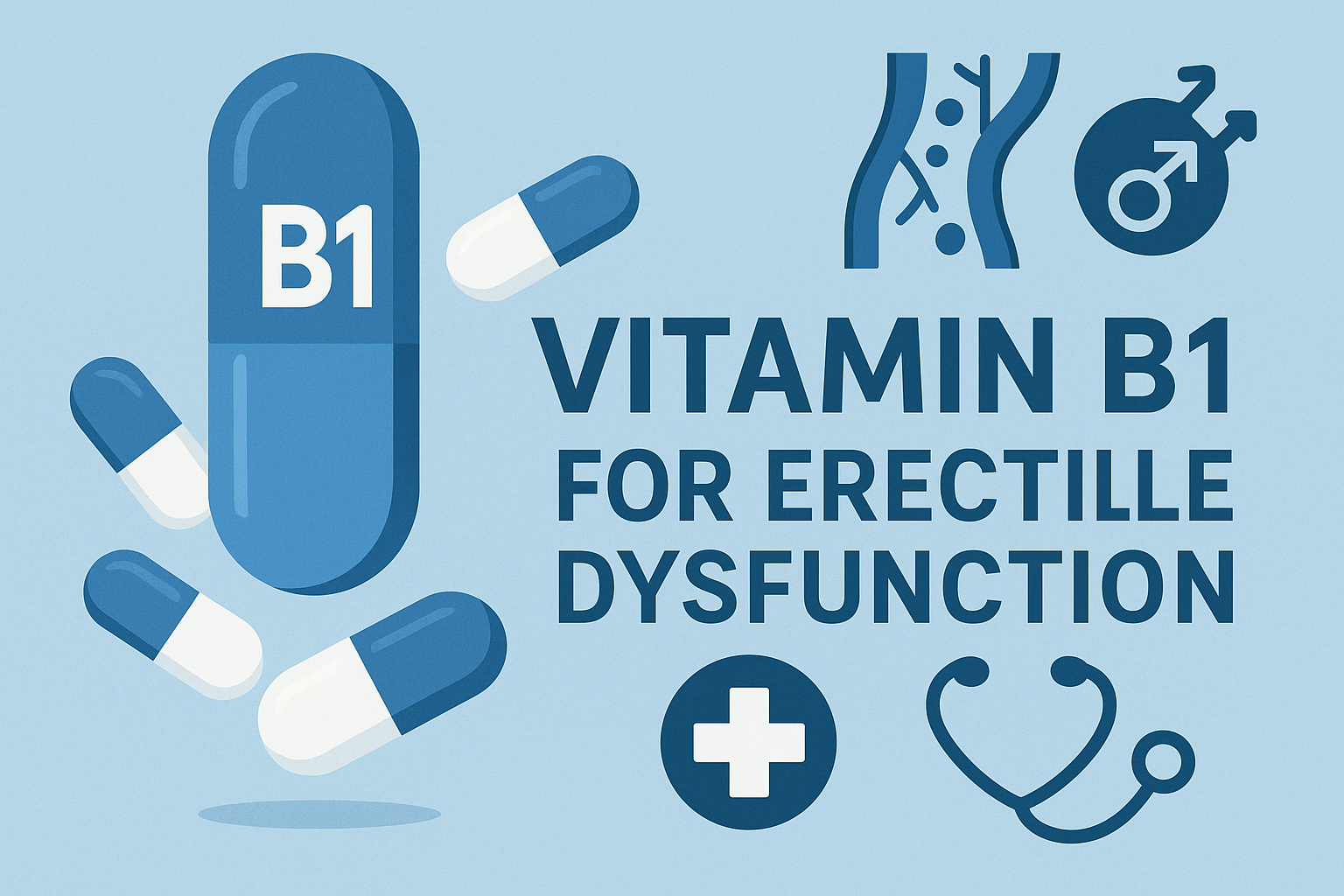Disclaimer
This article is for informational purposes only and should not be considered a substitute for professional medical advice. Always consult a healthcare provider before starting any vitamin or supplement regimen, especially if you have underlying medical conditions or are taking prescription medication.
Erectile dysfunction (ED) affects millions of men worldwide, and while it’s often linked to poor circulation, hormonal imbalance, or psychological stress, nutrition plays a major but often overlooked role. One essential nutrient that’s increasingly drawing attention for its impact on sexual health is vitamin B1, also known as thiamine. This vitamin is vital for energy production, nerve function, and cardiovascular health—all of which are necessary for achieving and maintaining erections.
Although vitamin B1 is rarely discussed in the context of ED, its contribution to nerve signaling, testosterone regulation, and blood vessel dilation makes it an important element of male sexual wellness. In this article, we’ll explore how thiamine affects erectile function, its connection with other systems in the body, and how to include it in your diet for optimal sexual performance.
What Is Vitamin B1
Vitamin B1, or thiamine, is one of the eight B vitamins that help the body convert carbohydrates into energy. It supports several essential processes, including muscle contraction, nerve impulse transmission, and heart function. Unlike fat-soluble vitamins, thiamine isn’t stored in large amounts in the body, so it must be consumed daily through food or supplements.
Deficiency in vitamin B1 can affect the cardiovascular and nervous systems, leading to symptoms like fatigue, muscle weakness, irritability, and poor circulation—all of which can contribute to erectile dysfunction. Because erections depend on efficient nerve communication and consistent blood flow, maintaining adequate levels of thiamine is vital for sexual health.
How Vitamin B1 Relates to Erectile Function
Erections are a result of a complex interaction between the brain, nerves, blood vessels, and hormones. Any disruption in this system can cause difficulty in achieving or maintaining an erection. Vitamin B1 influences several of these areas, directly and indirectly, making it important for overall erectile performance.
1. Supports Nervous System Health
Erections begin with a signal from the brain, which travels through the spinal cord and nerves to the penis. Vitamin B1 plays a central role in nerve conduction by helping produce neurotransmitters such as acetylcholine. These neurotransmitters transmit the brain’s signals that initiate arousal and trigger blood flow to erectile tissue.
A deficiency in thiamine can weaken this nerve signaling, leading to delayed or incomplete erections. Proper nerve function ensures that the signals for arousal are efficiently transmitted, resulting in a stronger and more responsive erection.
2. Improves Blood Circulation
Vitamin B1 contributes to healthy blood vessel function and supports the endothelial cells that line arteries and veins. It helps the heart pump more efficiently, ensuring proper circulation throughout the body, including to the pelvic region. Since ED is often caused by poor blood flow to the penis, improving cardiovascular performance through thiamine intake can enhance erectile strength and duration.
Studies show that thiamine deficiency can lead to a condition known as beriberi, which severely impairs the circulatory system, resulting in fatigue, shortness of breath, and vascular weakness. Even a mild deficiency can reduce circulation, making it harder to sustain an erection.
3. Boosts Energy and Reduces Fatigue
Erections are energy-intensive processes. The body requires energy to stimulate arousal, maintain hormonal balance, and support muscle contraction. Vitamin B1 converts glucose into energy and ensures that cells function efficiently. Low energy levels can decrease sexual desire and stamina, both physically and mentally.
By supporting energy metabolism, thiamine helps the body remain alert, responsive, and ready for sexual activity. Improved energy also enhances mood, which plays an important role in sexual confidence and performance.
4. Supports Hormonal Function
Although vitamin B1 doesn’t directly produce testosterone, it supports the endocrine system that regulates hormone production. Adequate thiamine helps maintain proper pituitary and hypothalamic function—areas of the brain responsible for signaling testosterone release. Optimal testosterone levels are essential for libido, erection quality, and overall sexual performance.
5. Combats Stress and Anxiety
Stress and anxiety are common psychological causes of erectile dysfunction. Vitamin B1 plays a role in stabilizing mood and supporting the nervous system under stress. It helps maintain balance in neurotransmitters like serotonin and dopamine, which regulate relaxation and pleasure. Chronic stress depletes B vitamins more quickly, which can lead to mood swings and reduced libido. Maintaining healthy thiamine levels can therefore help reduce anxiety-induced ED and improve emotional well-being.
Signs of Vitamin B1 Deficiency and Its Impact on Sexual Health
A deficiency in vitamin B1 can manifest in subtle ways that gradually affect energy, mood, and vascular health. Common signs include fatigue, muscle weakness, irritability, poor appetite, and tingling in the hands or feet. Over time, these symptoms may translate into erectile problems due to weakened nerve conduction and reduced blood flow.
Because thiamine is water-soluble, the body expels excess amounts through urine, so consistent intake is required. People with chronic alcohol consumption, diabetes, gastrointestinal disorders, or diets high in processed foods are at higher risk of deficiency. These same individuals are also at increased risk for erectile dysfunction, suggesting a potential connection between poor nutritional status and impaired sexual performance.
How Vitamin B1 Helps in Diabetes-Related Erectile Dysfunction
Men with diabetes are among the most affected by erectile dysfunction due to damage to blood vessels and nerves. Vitamin B1 plays a particularly important role for them because it helps reduce advanced glycation end products (AGEs)—harmful compounds formed by excess glucose in the blood. These AGEs contribute to nerve damage and vascular stiffness, both of which can impair erections.
Several studies have shown that thiamine and its derivative benfotiamine can improve endothelial function and nerve sensitivity in diabetic patients. Supplementing with thiamine may help prevent or reduce neuropathy and vascular damage, indirectly improving erectile response.
Food Sources of Vitamin B1
Getting enough vitamin B1 through diet is usually achievable if you eat a balanced mix of whole foods. Some of the best natural sources include:
- Whole grains (brown rice, oats, whole wheat)
- Legumes (lentils, black beans, chickpeas)
- Seeds and nuts (sunflower seeds, flaxseeds, pistachios)
- Pork and lean meats
- Fish (trout, tuna, salmon)
- Eggs and fortified cereals
Cooking can destroy some thiamine, so it’s best to lightly steam or bake foods rather than overboil them. For individuals with restricted diets or digestive conditions, supplementation may be necessary to maintain healthy levels.
How Much Vitamin B1 You Need
The recommended daily intake (RDI) of vitamin B1 for adult men is about 1.2 mg per day, but the requirement increases with physical activity, stress, and alcohol use. Men dealing with fatigue, nerve issues, or ED may benefit from higher intakes, typically between 25 mg and 100 mg daily through supplements, under medical supervision.
Thiamine is available in tablets, capsules, and injectable forms. Benfotiamine, a fat-soluble version of vitamin B1, has been shown to have higher bioavailability and may be more effective for nerve-related conditions like diabetic neuropathy.
How to Use Vitamin B1 for Erectile Dysfunction
- Through Diet
Include vitamin B1-rich foods in your daily meals. A breakfast of oatmeal topped with sunflower seeds and a lunch with lentils or lean meat can provide a natural boost. Consistency is more effective than occasional high intake. - Through Supplements
Men with chronic fatigue, diabetes, or nerve-related issues can benefit from B1 supplements. Look for benfotiamine or thiamine mononitrate in doses between 50–100 mg daily. - In Combination with Other B Vitamins
Vitamin B1 works best when taken as part of a B-complex supplement because B vitamins work synergistically to support metabolism, nervous system health, and hormone function. - With a Balanced Lifestyle
Thiamine alone won’t reverse ED if other risk factors like poor diet, alcohol use, or lack of exercise persist. Combine supplementation with a balanced diet, regular physical activity, and stress management for best results.
Scientific Evidence Supporting Thiamine and Erectile Health
Though direct studies linking vitamin B1 and erectile dysfunction are limited, several scientific findings support its indirect benefits.
- Research published in Diabetologia showed that thiamine improves endothelial cell function and reduces oxidative stress, helping blood vessels relax more effectively.
- Studies on benfotiamine demonstrated improvements in nerve health and glucose metabolism, which are critical for erectile response in diabetic men.
- A review in Nutritional Neuroscience found that thiamine supplementation enhanced cognitive performance, energy levels, and nerve function—all linked to better sexual health outcomes.
Collectively, these studies suggest that maintaining optimal vitamin B1 levels contributes to the physiological foundation necessary for proper erectile function.
Combining Vitamin B1 with Other Nutrients for Better Results
Vitamin B1’s effects can be enhanced when combined with other nutrients that support vascular and nerve health.
- Vitamin B6 and B12: Support red blood cell production and nerve repair.
- Magnesium: Improves muscle relaxation and enhances nitric oxide release.
- Vitamin D: Regulates testosterone and mood.
- Zinc: Essential for sperm health and testosterone production.
- L-arginine: A precursor to nitric oxide that improves penile blood flow.
Together, these nutrients form a comprehensive nutritional strategy for improving erectile strength and overall sexual function.
Potential Side Effects and Safety
Vitamin B1 is generally safe, even at higher doses, because excess amounts are excreted through urine. However, extremely high doses from supplements may cause mild nausea or stomach discomfort in rare cases. Individuals with kidney disease or those taking diuretics should consult their healthcare provider before supplementing, as these conditions can alter thiamine metabolism.
Alcohol consumption depletes vitamin B1 rapidly, so men who drink frequently should be especially mindful of maintaining adequate intake.
Lifestyle Tips to Complement Vitamin B1 for ED
While vitamin B1 helps optimize physiological health, ED improvement also depends on lifestyle habits.
- Exercise regularly: Cardiovascular exercise improves blood flow and nitric oxide production.
- Eat whole foods: Focus on lean proteins, healthy fats, and fiber-rich carbs.
- Reduce alcohol and smoking: Both impair circulation and nerve sensitivity.
- Manage stress: Meditation, breathing exercises, or therapy can help reduce performance anxiety.
- Sleep well: Poor sleep affects testosterone and energy levels.
These habits work synergistically with vitamin B1 to improve erectile response naturally.
Key Takeaways
Vitamin B1, or thiamine, is an often-overlooked nutrient that plays a significant role in maintaining erectile function. It supports nerve health, enhances blood circulation, boosts energy levels, and contributes to hormonal balance. Deficiency in this vitamin can lead to fatigue, poor mood, and reduced vascular function—all of which contribute to erectile difficulties.
Regular intake of vitamin B1-rich foods or supplements can help improve energy, nerve transmission, and overall performance. For men dealing with diabetes or neuropathic conditions, thiamine may provide additional benefits by reducing oxidative stress and nerve damage. When paired with other B vitamins, zinc, and a healthy lifestyle, it forms an effective foundation for long-term sexual wellness.

